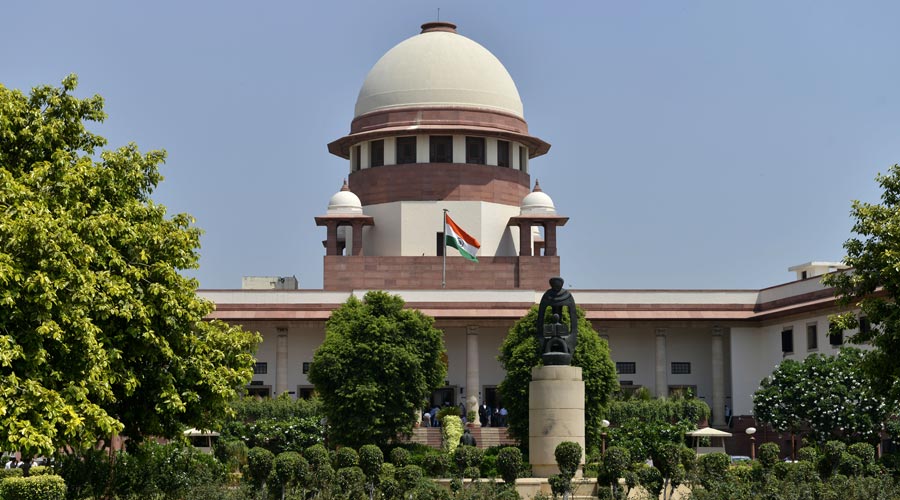The Supreme Court asked the Centre on Tuesday if the sedition law could be paused till it was re-examined, the apex court’s poser coming a day after the Narendra Modi government said that it would “re-examine and re-consider” the colonial-era law.
The Supreme Court asked the government to reply by tomorrow (Wednesday) to also say if those charged under the law can be protected till it was re-examined.
"We will give you time till tomorrow morning to take instructions from the government. Our concern is pending cases and future cases, how the government will take care of those till it re-examines the law," Chief Justice N.V. Ramana said, according to ndtv.com.
"In order to protect the interest of people who are already booked under the sedition law as well as future cases, Centre to file response on whether those can be kept in abeyance till law is re-examined," the Chief Justice said.
The Union ministry of home affairs, in an affidavit filed before the apex court on Tuesday, said the decision (to re-examine the law) was in tune with the views of Prime Minister Narendra Modi on shedding colonial baggage, reports PTI.
The affidavit noted that he has been in favour of the protection of civil liberties and respect of human rights and in that spirit, over 1,500 outdated laws and over 25,000 compliance burdens had been scrapped.
Tough questions
During the course of the hearing on a clutch of petitions seeking quashing of the provisions of Section 124A of the Indian Penal Code, citing its misuse by governments to stifle dissent, the judges were tough on the government which had asked for more time to review the law.
"The state says they are re-examining. But we cannot be unreasonable. We will have to decide how much time has to be given," Chief Justice N.V. Ramana said while hearing "Can someone stay in jail for months? Your affidavit says civil liberties. How will you protect those liberties," the Chief Justice asked, reports ndtv.com.
A ‘pattern’ to seek more time
The lawyer representing petitioners, Gopal Sankaranarayan, said it was becoming a "pattern" with the government to seek more time to delay important cases, referring to the marital rape hearing.
"We have to look at both sides," the Chief Justice said in response.
"When the affidavit says PM is cognizant and has often spoken about civil liberties and human rights and diversity of thoughts, 75 years of independence, outdated laws being scrapped, laws causing hindrance to people, concerned about civil liberties etc. They are saying they are doing a serious exercise. It should not appear that we are unreasonable. There are concerns about pending cases and misuse," Justice Ramana said.
Solicitor General Tushar Mehta said FIRs (First Information Reports) under the sedition law were executed by states, not the Centre.
How about a moratorium?
Then, Justice Surya Kant suggested a moratorium on sedition cases. "Mr Mehta, take two-three months. The modification of law takes time. But why don't you issue a directive from the Centre about future cases," he said, according to ndtv.com.
"We cannot say what will happen in future...these are penal offences. There has been no history where a penal law has been prevented from being used," the government's lawyer said.
"But you said states file FIRs. So you tell states that until the matter is pending do not file sedition FIRs,” Justice Hima Kohli said.
Spirit of Azadi ka Mahotsav
On Monday, days after defending the sedition law, the Centre told the court that it has decided to re-examine and reconsider provisions of the colonial-era law.
In an affidavit filed in the apex court, the government said: "In the spirit of Azadi ka Amrit Mahotsav (75 years of Independence) and the vision of PM Narendra Modi, Government of India has decided to re-examine and reconsider the provisions of Section 124A, Sedition law."
The government urged the Supreme Court to wait for the review before deciding on the case based on a clutch of petitions filed by the Editors' Guild of India and others.
SC concerned at misuse
In July last year, the apex court expressed concern at the widespread misuse of the sedition law to target critics of the governments at the Centre and in states. The court had asked the Union government why it was not repealing the provision used by the British to silence people like Mahatma Gandhi.
On Saturday, the government defended the sedition law and a 1962 verdict of a constitution bench upholding its validity, saying they have withstood "the test of time" for about six decades and the instances of its abuse would never justify reconsidering it.
On Thursday, a bench of three judges comprising Chief Justice NV Ramana, Justices Surya Kant and Hima Kohli had said that it would on Tuesday hear arguments about sending the pleas challenging the law on sedition to a larger bench for reconsidering the 1962 verdict of a five-judge constitution bench in the Kedar Nath Singh case.











